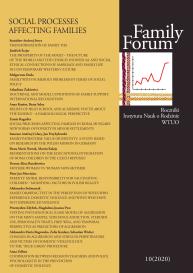The Prosperity of the Family – the Future of the World and the Church
The Prosperity of the Family – the Future of the World and the Church
Individual and Social Ethical Connections of Marriage and Family Life in Contemporary Western Culture
Author(s): Jindřich ŠrajerSubject(s): Sociology, Theology and Religion, Family and social welfare, Demography and human biology, Sociology of Religion
Published by: Uniwersytet Opolski
Keywords: marriage; family; ethics;
Summary/Abstract: From a historical point of view, it can be argued that the cultivated arrangement of the relationship between man and woman, the support of the institution of marriage, and therefore families, have always been one of the important requirements of individual cultures and religions. There is also a close connection between the state of society (and the dominant requirements in it) and the form of personal and family life. In the Western cultural space with the decisive ecclesiastical discourse, the view of marriage and the family was not spared from one-sidedness and problematic practice. The current magisterium of the Catholic Church remains critical of some contemporary trends and phenomena, including the questioning of the very institution of marriage and the family. At the same time, it remains open to new challenges in this field.The article aims to critically reflect on some issues related to the current situation of marriage and the family, especially the individual and social ethical context of married and family life in contemporary Western culture.Using a reflection of the findings of selected authors, especially of sociologists (Lipovetsky, Beck), the article demonstrates the reality of problematic „points“ of the present time (marked by magisterial texts by Pope Francis) and their connection to married and family life. It thus verifies the thesis that the preconditions for marriage and the family are currently weakened in the Western area. This state of affairs include even the institutions that want to invoke the necessary personal and social responses to the problematic situation. Although the study does not capture the full range of issues and problems currently associated with marriage and the family, it does demonstrate that marital and family relationships in contemporary Western culture are conditioned by a number of factors. Those cannot be fully influenced by the individuals directly affected. The study points to the crucial role of politics, including its responsibility and to the exclusive role of the Church. The Church can, in many respects, increase respect for the institutions and bring a concrete help to the people.The result of the study is an emphasis on the fact that, in the current situation, it is not easy for individuals or families to maintain their own integrative values. It is not easy to withstand the pressures from the outside, to not succumb to the vision of success offered by the majority society. It is also problematic that the focus of politics is not predominantly on the family but, above all, on the immediate interests of the individual. Politics is irresponsibly undercutting itself in order to get into favor of individuals.The conclusion of the study confirms the validity of the magisterial belief that the prosperity of the family is crucial for the future of the world and the Church. Marriage and the family are natural communities that correspond to a person‘s anthropological setting. They allow him or her to find his or her own identity. They are a guarantee of the humanization of the person and society, a protection against deformations of the individualistic or collectivist type.
Journal: Family Forum
- Issue Year: 2020
- Issue No: 10
- Page Range: 37-55
- Page Count: 19
- Language: English
- Content File-PDF

